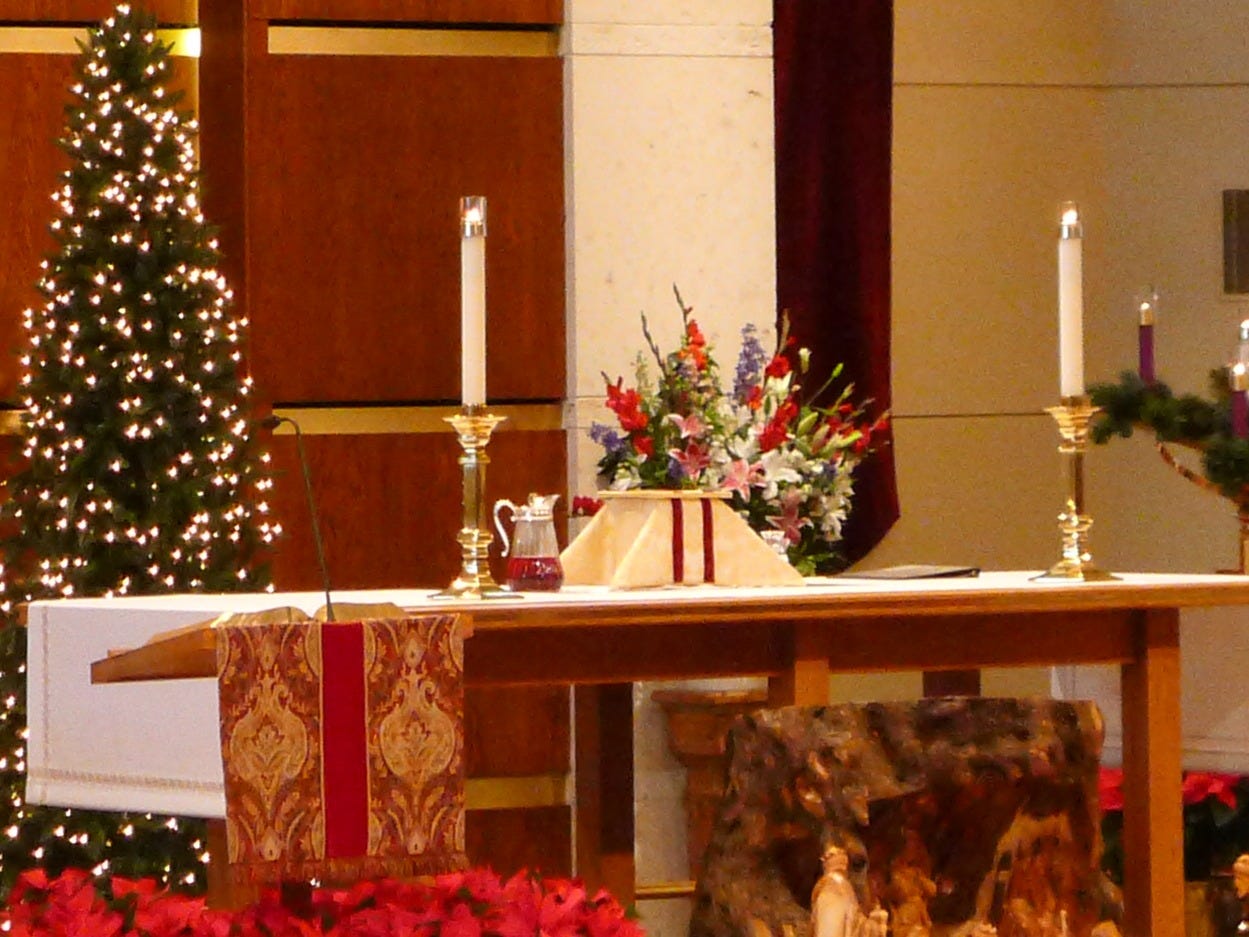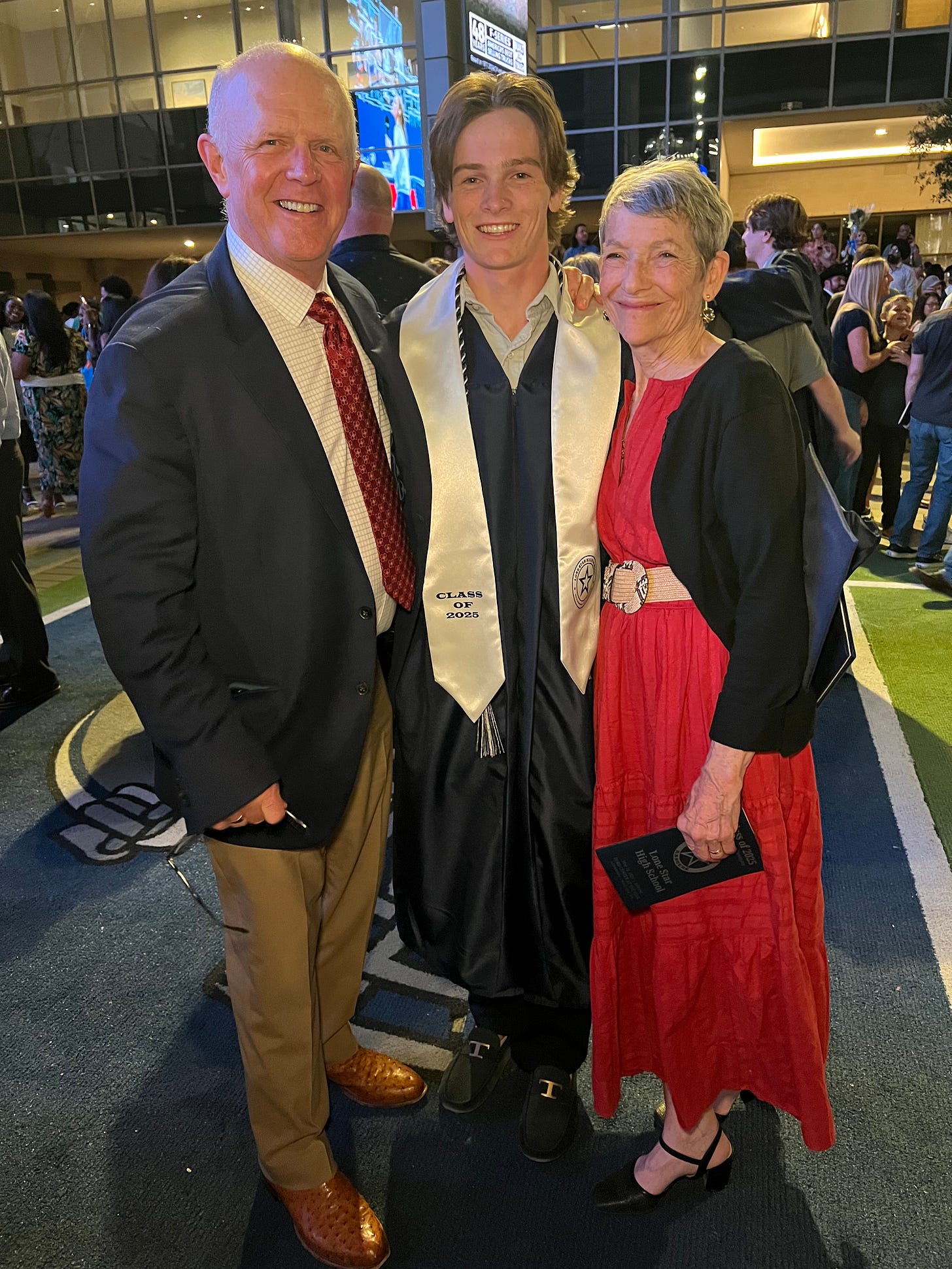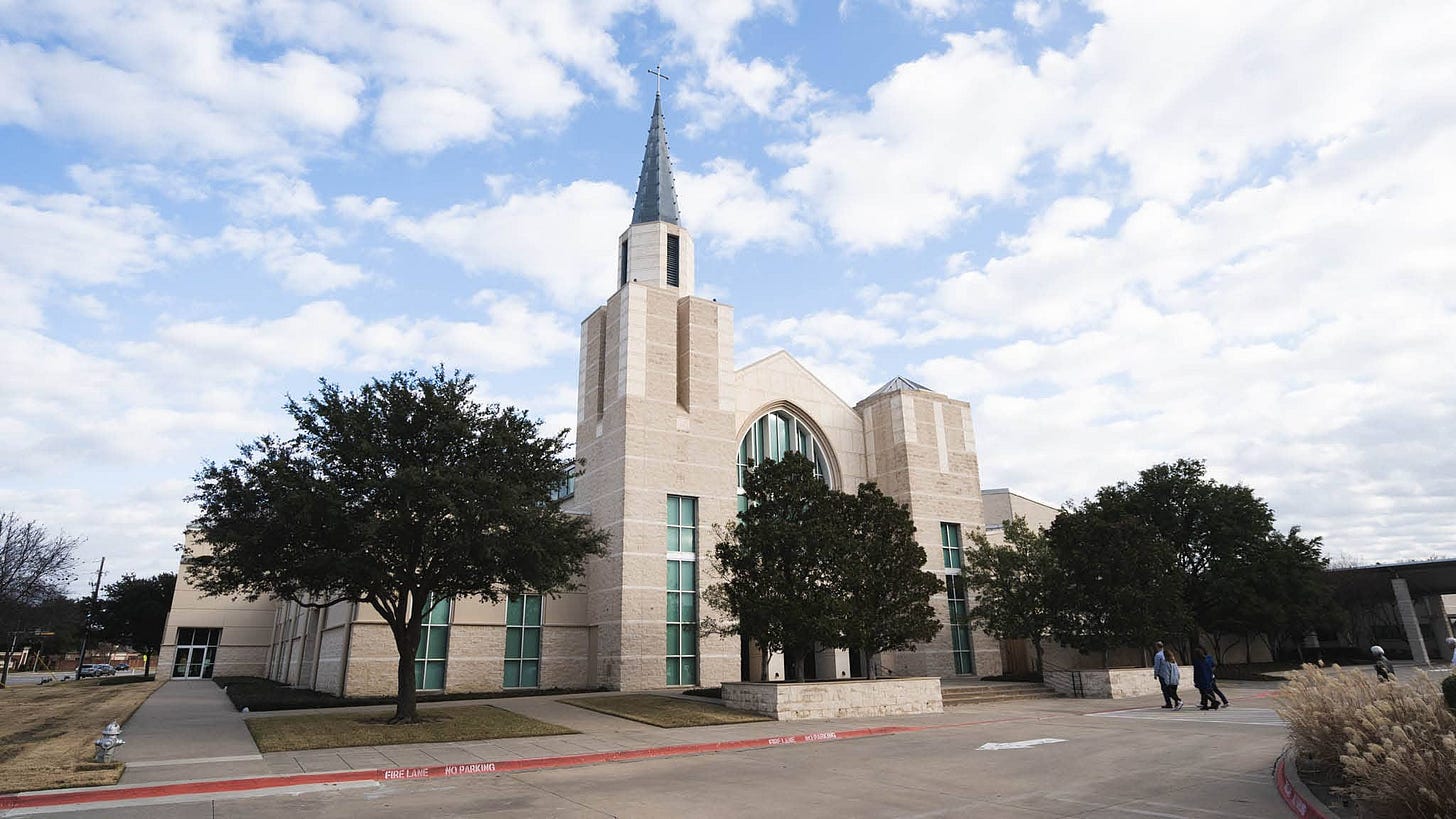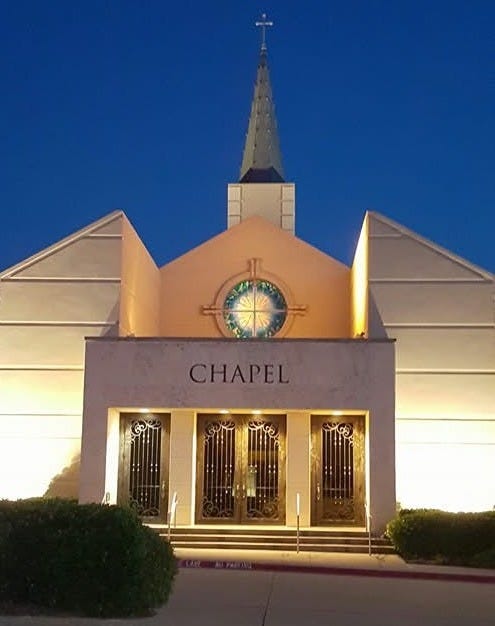Author’s Note:
Three quick things:
This happened last night. My oldest grandson graduated from Lone Star High School in Frisco, Texas—one name out of 500, but sweet music to my ears. We have five in total: one a sophomore at Oklahoma, Moses, and three others in high school, lined up for graduation over the next three years.
For years, I’ve wanted to capture the monumental events that shaped the extraordinary parish of Christ Church. Each story I write brings back memories and lessons rich with meaning and full of God’s faithfulness. Thank you for reading them—and for walking this journey with me.
They’ve not all been pleasant memories. There were many moments of grace, but some are laced with sadness, confusion, or hurt. I will share these thoughts, too.If you’ve been reading these stories and finding them meaningful, would you consider becoming a Paid Subscriber? If you’re currently a Free Subscriber, think about upgrading to Premium for just $8 a month—or $80 for the entire year (that’s only $6.67/month!).
Some wonder about our subscription drive to add 70 paid subscribers by my 70th birthday on May 27, which is just five days away. I didn’t think we’d make it. However, the post about 1967 brought in nearly 30 subscriptions, 10 of which were paid.
Then my post yesterday about the cover-up led to two others canceling—and a slew of spirited comments. (I don’t like writing about politics. It leads to ugly comments and name-calling. I’ll limit it in the future. That’s not what the Anglican is for.)
And of course, whenever someone upgrades their subscription…an angel gets its wings. Or something like that.
Grace and peace,
⸻⸻⸻⸻⸻⸻
After the Break Up
Retreat. Regrouping. And Restoring Mission
The Sunday after our departure from the Episcopal Church was one of the strangest mornings of my ministry.
The sanctuary was packed. It looked like Christmas. It felt like Easter. There was standing room only, and you could see it in people’s eyes: they came to hear what had happened—and what would happen next.
I stood to speak, though I don’t remember exactly what I said. I’m sure I shed a few tears. I reminded the congregation why we had made the decision, what the gospel meant, and what our mission still was: to be a place of refuge, healing, and hope, not judgment.
We were not here to talk down to anyone, judge anyone, or draw battle lines. The world had enough of that. I told them—as I had always believed—that the church should meet people where they are, point them to the hope of Christ, and let the Spirit do the convicting and transforming work.
I never wanted to be a firebrand on issues—or a symbol of some cultural pushback. That was never my calling. I wasn’t trying to lead a charge or make headlines. I was trying to lead a church. I believed then—and I still do—that conviction must walk hand in hand with compassion.
We didn’t leave the Episcopal Church to create enemies. We left to remain faithful to the Scriptures.
But even in that, my deepest hope was that we could be known not only for what we believed, but for how we loved.
But nuance is a difficult thing to maintain in headlines. The narrative was set.
And slowly, something began to shift in the life of our church.
The Tension Leaves—But So Do People
A week later, I gathered the staff. There was relief in the room. The tension we had all lived with for months—maybe years—was gone. We had made our decision. But within weeks, members—they would be called ‘former members’— stopped showing up. Not en masse, just one by one.
We had fought valiantly. And yet, our attendance, which had hovered around 2,000, began to drop. Fifteen hundred. Sixteen hundred. Still significant, yes—but noticeably different.
I spent months thinking about why.
Some didn’t want to belong to a church that could be mistaken as homophobic. I understand that. The world is quick to label and slow to listen, and it grieved me that our story would be read through a lens of rejection rather than redemption.
Others were confused. We were no longer “Episcopal,” and people didn’t know what “Anglican” meant. It’s an old word, rooted in a distant place. Christ Church on the Texas prairie didn’t easily fit a British profile.
Standing Out, Slowing Down
It took me over a year to fully realize it, but here’s what I came to understand.
When we were in the Episcopal Church, we were the loyal opposition. The denomination had drifted into progressive waters, but we held our ground. If we had a tagline, it might have been: “We’re Episcopal… but not THAT kind of Episcopal.” That contrast made us stand out. We were like Chick-fil-A in the fast food world—same broad category, but Christ Church was unmistakably different.
We were the zebra in a herd of horses, and that difference turned heads and drew people.
But once we stepped out of the Episcopal Church, we were no longer “the different Episcopal church.” We were just another church on a busy street in North Texas. Many good churches surrounded us, but the distinctiveness that once defined us seemed to fade. We had been known for what we were not. Now we had to rediscover who we were.
So what do you do when your recent identity no longer applies? You go back. You go deep. You stand, as Jeremiah said, at the crossroads and ask for the ancient paths. (Jeremiah 6:16) You remember why you got into this in the first place—not to fight denominational battles or make headlines, but to introduce people to Jesus Christ.
That had always been the mission. And it still was.
Becoming Anglican
We made some deliberate choices. Some seem silly now, but they were exercises in determining our direction.
I asked our clergy to wear clerical collars again—not out of formality, but as a quiet signal of spiritual availability. We returned to the hymnody that had shaped generations of faith. I preached from the pulpit with renewed clarity and conviction. We re-emphasized catechesis, confirmation, and the liturgical rhythms that marked us as Anglican

.
As I mentioned the my post about 1967, the 39 Articles of Religion of the Anglican Church were decommissioned by the Church of England in 1968 and were relegated to the historical section the 1979 Book of Common Prayer. But the defintion of what a church is in Article 19 is golden. And it became the simple formula in my mind for what we were and what we needed to do:
XIX. Of the Church. The visible Church of Christ is a congregation of faithful men, in which the pure Word of God is preached, and the Sacraments be duly ministered according to Christ's ordinance, in all those things that of necessity are requisite to the same.
We weren’t adrift—we were anchoring. We weren’t generic—we recovering roots. Slowly, people began to understand. This wasn’t a branding exercise; it was a return—a recalibration. We were becoming Anglican—not in name only, but in heart and habit.
And yet… something was different. The momentum had slowed. People weren’t as quick to invite their friends. Attrition is a beast. For years, our identity had been forged by contrast. We were the alternative within a broken system. We were conservatives in a sea of liberalism. But when that system faded from view, we had to learn how to simply be the church again.
The Breaking Point
The truth is—I was tired.
No, more than tired. I was spent.
In those months, something in me began to crack. I couldn’t always name it, but I could feel it. I was breaking in ways I couldn’t articulate.
From time to time, a former member would send a note to explain why they had left. I wanted so badly to respond—to explain my heart, to clarify the purpose. But the chance to explain never came.
What stung even more were the families who had once cheered me on—urging me to “pull the church out of the Episcopal Church”—and then quietly left for other local Episcopal parishes. I tried not to take it personally. Often, it was a marital decision. One spouse felt one way, the other disagreed. They chose unity. Fair enough. But it still cut deep.
Then I heard that a group of men—friends, long-time members—were meeting together for a private Bible study. I heard they had said they were gathering to “pray for the rector.” That should have been encouraging. But it wasn’t. It felt ominous. The concern, I later learned, was that while we had left the Episcopal Church, I hadn’t taken us far enough—particularly on the issue of women’s ordination. (I’ll speak to that in the next post.)
I decided to pay a surprise visit to their Saturday morning meeting.
I sat in a circle of men I had baptized, taught, buried parents for, counseled in crisis, walked with for years. One I had led to Christ. One was teaching a class but refusing to attend church. I had publicly defended him during a very ugly and awkward social situation. Another wasn’t attending Christ Church at all. One had served on the Vestry.
They told me they loved me.
But…
It was the “but” that turned my stomach. I hadn’t gone far enough. I wasn’t preaching a full gospel. I didn’t have the right stance on millennialism. (That was a big deal in the Dallas area.)
The feeling of betrayal is hard to describe. There’s a unique kind of loneliness that comes from watching trusted friends pray about you instead of pray with you. Or for you.
I asked them to stop praying about me—it felt manipulative. I told them to stop meeting on campus.
Then I walked out.
Some of them left the church.
Some apologized.
But something in me had broken open. Not because of that, but because of everything.
I was empty.
I went to the Vestry and told them something I hadn’t told anyone else: I needed a break.
It was the first time in 24 years that I stepped away for an extended leave. In 2008, Fran and I took a sabbatical. We began our time away in a quiet beach cottage in Florida. The ocean was calm. The days were still. I didn’t know how badly I needed stillness until it arrived.
Fran and I had always been partners in ministry. But we also needed time—just the two of us—to process, to grieve, to find our bearings again. While I spent two weeks in Waco building a rocking chair, she took a long road trip through California to be with a grieving friend. Each evening we’d talk—I from the my Motel 6 room, she from a diner or motel.
In those quiet conversations, we began to name the deeper things—the cracks that had begun forming in our family, the griefs we had not faced, and some unspoken burdens we were carrying.
I stepped down from my role as Chairman of the Board at Trinity School for Ministry. We re-centered our care and love on what mattered most. Our family. Our marriage. We understood—at last—that the cultural and generational storms we were weathering weren’t just theological. They were deeply personal.
The press framed everything in stark, binary terms. Us vs. them. Progressives vs. conservatives. Orthodoxy vs. heresy.
But we weren’t fighting a culture war.
We were just trying to be faithful not to a cause, but to an ideal we found in Scripture: marriage and the human family. And the cost of that faithfulness was beginning to show.
Coming Home
I was away from Christ Church for three months.
And if there’s one thing I learned from that sabbatical, it’s this: never take three months off—especially not at a time like what we were in.
When I returned, everything had changed.
The Executive Pastor who stepped in during my absence didn’t quite carry the culture or vibrancy that defined Christ Church. He was capable but not aligned. When I walked into the 11 o’clock service, it felt… asleep. The energy was gone. The room felt hollow. It was thinned out.
I remember asking myself, Where did everybody go?
I soon discovered the answer.
They were across the parking lot, in the chapel.
.
A new sound had emerged there—a new image, a new musicality. The service was called Chapel Hill, started by one of our assistants, Greg Methvin, and later led by my son, Jed Roseberry, and Clint Kerley, both priests on the Christ Church staff. It had caught fire with the younger generation—non-Boomers, creatives, seekers who wanted something less polished but more passionate. The room was full. The worship was alive. Josh Havens of The Afters was the vocal lead behind the worship service.
So I did what leaders sometimes do when they’re playing catch-up: I called everyone together. One Sunday, we gathered the whole church—main sanctuary, Chapel Hill, all of us—for a single, unified service.
And that’s when I heard it.
The choir lifted their voice. The vocal team joined in. And then Josh Havens added something electric and raw to the mix. It was beautiful. Powerful. Alive.
After the service, I looked at the Chapel Hill leaders and said, “Thank you. This is what we need. I need this in the big room.”
And we moved. Quickly. Maybe too quickly.
I shifted the energy of Chapel Hill into the sanctuary. We brought the music, the leadership, the sound, the spirit into the heart of Christ Church. I asked the entire Chapel Hill congregation to join us for one big service week by week.
But something happened along the way. That young, passionate, non-boomer generation that had built something fresh and raw—they didn’t want to lose it. Not entirely. They had created something they believed in. And they weren’t going to let go of it without a conversation.
We had a few of those conversations—congregational meetings. Someone even started a petition on Facebook. Facebook? Petition? I was in a new era, whether I liked it or not.
But in the end, I knew we couldn’t sustain a church with two different musical worlds—one for the “old” people and one for the “cool” people. That wasn’t unity. That was fragmentation.
So we blended our two main services—the nine o’clock and eleven o’clock—into a unified sound and style. It was bold. It was risky. I thought it was great.
But it also lit a fuse.
Some of those same young leaders, having found their voice and vision, realized they weren’t content to adjust to accomodate a boomer service—they wanted to plant. They didn’t just want to inherit a church—they wanted to birth one. And so, a new chapter began.
It was 2009, and the Anglican Church in North America was forming. My friend and the bishop of Pittsburgh would installed as its first Archbishop. During his inaugural sermon, he made a statement and a prediction that rocked the new movement. He called for the planting of 1,000 churches in his tenure—a five year term.
A thousand churches in five years.
Christ Church, which had only planted a church or two before, was about to become a church-planting machine and lead the charge for the entire Province.
And that’s what we’ll talk about next time in The Christ Church Stories.
Grace and Peace,
About Writing:
You can tell that I love to write. It used to be a chore and a challenge. Now, it is just a challenge. After I left Christ Church, I didn’t have a place to preach. So I took my sermon preparation mojo and funneled it into writing books. Many books. I invite you to take a look yourself at my Amazon Author Page.










Interesting quandary about the different worship styles. I might’ve been one of those old cuds that wanted to stick to traditional worship. But I also remember when I was quite a bit younger, that was not my style. It is interesting and heartening that today a lot of the Gen Z people like traditional worship, too.
The type of music is adiaphorous-a solid Anglican concept. Scripture and the Eucharistic rite are not. The distinction needs taught to the people!